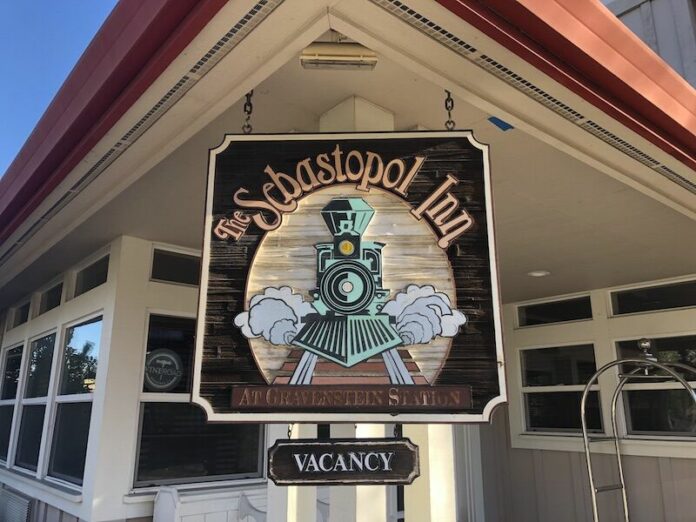Sebastopol mayor and West County Community Services director discuss Sebastopol Inn
While Sebastopol awaits to hear about the county’s plans to convert the Sebastopol Inn into housing for elderly, COVID-19-vulnerable homeless and currently-housed homeless people at the city council’s Dec. 15 meeting, Sebastopol Mayor Una Glass made one thing clear — the plans are out of city council control.
“I’m getting emails from people saying, ‘You guys need to slow down the process,’ and ‘You need to have more public input,’ et cetera, et cetera,” she said. “It’s not Sebastopol city council’s purview, it’s actually a county project.”
When asked about the project, county staff directed Sonoma West Times & News to information about the Dec. 15 council meeting, which begins at 6 p.m. and is being held virtually.
The California Department of Housing and Community Development (HCD) granted Sonoma County the funding in November to buy the Sebastopol Inn and Santa Rosa’s Hotel Azura to shelter Californians most susceptible to the virus, according to the county’s webpage for the state’s Project Homekey program.
“We have no control over property that’s owned by the county, so when they choose to buy a project in our city, then it’s their regulations,” Glass said. However, the city council has invited county representatives to present the plan of action on Dec. 15 so the community can provide feedback and the council members can voice their concerns.
According to Glass, the city council was also curious how the process works and who will manage the project, both of which are on a list of other questions currently being drafted. Her understanding so far is that the program will first prioritize formerly homeless people who can’t risk exposure to the virus and then transition to permanent supportive housing once the pandemic subsides.
“So, as a city, we’re interested in who’s going to operate that facility,” Glass said, adding West County Community Services (WCCS) manages a similar facility nearby called the Park Village Housing Project. “We’re interested in, ‘Well, WCCS has done a really good job with that, is there a possibility they could run this facility?’”
The mayor said publicly-funded projects like this typically involve a Request for Proposal (RFP) process where different organizations engage in competitive bidding. The future operator of the Sebastopol Inn will be chosen by the county, not Sebastopol.
“But the city of Sebastopol, we could consider as a council sending a letter to the county asking that they strongly consider somebody — for example, WCCS — as the operator because they’ve done such a great job with our other project,” she said.
According to Glass, the Sebastopol Inn project application for Project Homekey missed the first round of funding and could have expired on the waiting list if another city’s proposal hadn’t lost approval.
“So, then that project fell through, so then the state called up the county of Sonoma and said, ‘Okay, that one’s off, so now you guys get funded. So that’s kind of how it happened and that’s why it’s so bizarrely fast-tracked,” she said.
The county is bound to a state deadline to take decisive action on housing people. According to the California Department of Housing and Community Development, the federal Coronavirus Relief Funds that comprise most of Project Homekey grant funding must be spent by Dec. 30, 2020. Per the department, Dec. 30 is also the date projects involving an acquisition must close escrow.
“When I see emails from the public saying ‘you need to slow this down, you need to take more public input, you need to have the public’s concerns or some of these issues be addressed better. It’s a digital kind of thing. It’s on or it’s off,” Glass said. “If they’re going to get the money, they have to do it by the end of the year or else it’s off, period.”
There’s more than one misconception floating around about the future of the Sebastopol Inn and its 31 rooms. Glass said, “I was really distressed to hear some people call it a homeless shelter because it’s not a homeless shelter. It’s really different than that. This is not something where people are coming in off the street to sleep there overnight. It’s not like that.”
The mayor said it may be a smart decision on the county’s part to first opt for an agency with medical support capacity for the medically at-risk hotel residents before opening up to other entities, like WCCS, run by executive director Tim Miller.
Glass said, “It’s a competitive process, but I personally think that Tim has done a really good job, as our West County Community Services is really kind of an awesome nonprofit. And I think other people on the council feel the same way, and our city staff feels that way because they’ve done a really good job of managing Park Village.”
She said 5th District Supervisor Lynda Hopkins strives to keep the council in the loop. “It is the county’s project, but she’s kept us informed so that we could have public meetings where the public could get information about what’s going on.”
West County Community Services executive director hopes to get involved
“The big picture is yes, we would like to be involved in the program,” Miller said, confirming West County Community Services has had conversations with both the county’s Community Development Commission (CDC) and the city of Sebastopol.
“My understanding is it’s going to be owned by the county, but within the city of Sebastopol’s city limits, so there’s different jurisdictions at play.”
The organization’s candidacy depends on county decisions progressing from housing provided during the pandemic into the form the Sebastopol Inn takes after the worst of the crisis has passed, he said.
Like Glass, Miller said the county may decide to first contract a medical service provider because Sebastopol’s first residents will have significant health conditions and factors rendering them susceptible to virus complications.
The county may at some point begin accepting proposals from organizations to operate the site, but the CDC could answer more clearly, he said.
“If and when it transitions to permanent supportive housing, that’s when we would be involved. Well, I hope,” he said. “Usually they put out a request for a proposal and then other agencies can apply.”
Miller said if WCCS came out on top in the RFP process, the organization would provide housing and management services, as well as social services like education and employment counseling.
“But we wouldn’t provide any medical services because we’re not a medical organization,” he said, noting that WCCS offers counseling and behavioral health, but doesn’t have nurses on staff who can provide physical medical services.
Miller said WCCS operates and services Park Village, two properties closer to Santa Rosa from where the Sebastopol Inn sits on the edge of town. Park Village follows a similar permanent supportive housing model, but the property is owned by Sebastopol.
He said the program is similar to WCCS’ Mill Street Supportive Housing in Guerneville, but Park Village is one of trailers and RVs in a mobile home park instead of apartment units. Residents of Mill Street receive wrap-around services and case management addressing “their medical, financial and other personal needs,” according to the WCCS website.
“Let’s just say you have a mental illness or you have a drug and alcohol problem, or you just lost your job and found yourself living in your car. We’re not just going to put you in that room, we’re going to provide you support,” Miller said.
He said under the HUD definition, such programs allow residents to live there paying only 30% of their income for rent, and if a resident doesn’t have income, a case manager works to connect the individual with a job, general assistance or their social security.
Miller said the housing is permanent, but a permanent stay isn’t typically the end goal.
“While they can live there for the rest of their life, for most people, the idea is to get them inside, stabilize them and help them move to more independent living, which is at a less of a cost to society as a whole, if you will. And then take someone else off the streets and put them in that spot,” he said.
Miller said being prepared to provide the right level of care and enough of it is paramount to providing successful permanent supportive housing.
“So, if you’re moving people in, you can’t just walk away from them because going from the streets, after years on the streets, and into a permanent site is a recipe for disaster in many cases unless they have the support that they need, both medical and otherwise to succeed. So that’s the key.”
Daniel Virkstis, county public information officer, affirmed over email that county representatives will provide more information about the Sebastopol Inn’s Project Homekey timeline, funding details and more on Tuesday, Dec. 15.









